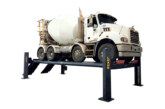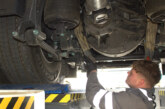The role of workshops in meeting net zero target

Tom Hyde, technical and product quality manager at TotalEnergies UK dispenses some practical advice with regards to HGVs, lubricants and sustainability.
Set to be valued at over $4 billion globally by 2025, road haulage is a critically important global industry. But the sector faces a major challenge. HGVs and freight transportation remain reliant on carbon-heavy resources. To achieve net zero by 2050, road transport emissions will need to drop approximately 80% by 2035, requiring dramatic cuts in fossil fuel usage, combined with the adoption of sustainable low-carbon emission technologies.
Whilst there is no single solution for curtailing HGV emissions, the urgency of this challenge is creating a paradigm shift in the industry, with manufacturers, researchers and policymakers collaborating to facilitate decarbonisation and adaptation.
While much of this remains a work in progress, fleet managers and workshops can take steps immediately to contribute to the green transition:
Step One:
Invest in fuel-efficient vehicles and products
Ultimately, the most effective way to reduce carbon emissions is upgrading fleets to modern, fuel-efficient, or even renewably powered vehicles that comply with the latest emission standards. Most operators, though, will still be choosing diesel engines when they next renew their fleets – so optimisation and efficiency are key.
Advanced technologies such as aerodynamic enhancements, low rolling resistance tyres, and idle reduction systems can also increase vehicle efficiency and be more sustainable in the long run. Alongside this, regular maintenance of vehicles is crucial to ensuring peak operation – this means properly inflated tyres, clean air filters – and well-maintained engines.
Using the right lubricants to maintain engines is essential to the operation of fleets looking to become more sustainable. Lubricants have historically been seen as a something of an afterthought or technical detail, but according to TotalEnergies’ findings, the right lubricants can deliver 5% fuel or energy savings across heavy duty machinery and vehicles. Even modest savings in fuel efficiency can add up across a fleet, and, in turn, across the industry, saving fleet managers both time and money.
Lower maintenance costs and increased efficiency is possible through the right lubricant choice – by choosing products with reduced friction and viscosity (such as our own RUBIA Optima 3500 FE 5W-30), engines can be kept in good working order, for longer. These efficiency gains provide both emissions reductions and cost control benefits equating to between 2% and 3% increases in fuel efficiency for commercial vehicles.
Where fleet managers spend time and money choosing the right vehicle, the same time and care should be spent choosing the right products to maintain these essential pieces of equipment. To this end, TotalEnergies’ LubAnac oil diagnosis can also allow fleet managers to diagnose worn lubricants, providing preventative maintenance and extending the life of equipment – which may also improve resale value.
Step Two:
Eco-friendly driving practices
Encouraging and training drivers to adopt fuel-efficient and eco-friendly driving habits. This includes practices such as smooth acceleration and deceleration, maintaining a consistent speed, and avoiding unnecessary idling.
Moreover, leveraging technology in driving not only streamlines operations but also can help ensure compliance with regulatory requirements. For example, implementing telematics systems can provide real-time feedback to drivers, optimising fuel efficiency. Modern telematics systems provide real-time data on vehicle location, fuel consumption, and driver behaviour – information vital for making informed decisions and preventing unnecessary fuel expenditure.
Another crucial aspect of managing an HGV fleet is training. Well-trained and engaged drivers are less likely to be involved in accidents and more likely to operate vehicles efficiently. Regular driver training programs can reinforce good practices, contributing significantly to reducing fuel consumption and emissions and thus also the net zero target.
Step Three:
Optimising load management
On a practical level, efficient route planning can help minimise fuel consumption and reduce emissions. Route optimisation software to plan the most fuel-efficient paths and combining shipments to maximise the payload of each journey, reducing the overall number of trips. Implementing balanced load management practices can contribute to overall fuel savings and improve the overall efficiency of your fleet.
Step Four:
Getting to grips with disclosures
Organisations throughout the UK are establishing goals to meet net zero greenhouse emissions by the UK’s target date of 2050. Mandatory disclosure of emissions is becoming a standard requirement for both UK and international businesses. The Companies Act 2006 also mandates that publicly listed companies in the UK measure and report their emissions, and a growing number of entities are incorporating emissions measurement and disclosure into their Corporate Sustainability Reporting. Numerous UK enterprises are also actively participating in the Science Based Target Initiative, setting ambitious emissions reductions by 2030 and 2050.
Getting to grips with reporting requirements and adapting to this change will become essential as the UK moves closer to its net zero deadline, and some ‘first mover’ logistics and freight operators, such as Stobart, have already taken steps to introduce SBTi commitments. More in the industry will undoubtedly follow, and looking ahead, there will likely be financial penalties for companies that do not reduce their environmental impact and adapt – and potentially commercial implications if customers choose to partner with supply chain providers who align with their own emissions reduction goals.
By increasingly integrating these practices and considerations into operations, HGV fleet managers can make significant strides toward creating a more sustainable and environmentally-friendly transportation system.





![Bosch outlines ESI[tronic] workshop software](https://cvwmagazine.co.uk/wp-content/uploads/2025/07/Bosch-ESItronic-25-165x109.jpg)



